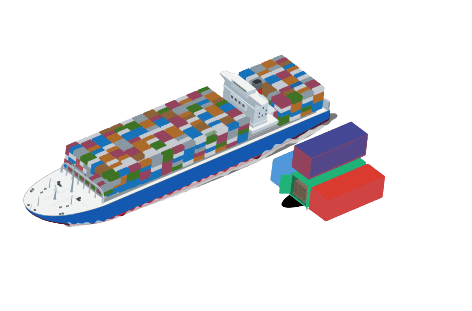Data Intelligence in freight quoting is not about a system or robot to replace Pricing, nor to replace good old strategic negotiation in the meeting room.
On the contrary, it refers to a tool that will gradually become essential for efficiently, safely, and swiftly quoting all types of cargo. From minimal cargo for just one client on a specific route to large volumes, with various variables (routes, commodities, periods, etc.).
Find out what we have to explain about this item.
What is Data Intelligence?
In general terms, Data Intelligence is a company’s ability to map, compile, process, and measure the data that flows within and through the company.
Nowadays, data collected and merely stored, without analysis, treatment, or mapping, can be compared to idle assets, turning into missed opportunities. Missed opportunities mean losses, at any level of the logistics chain.
It is literally extracting business from a volume of information. Undoubtedly, international trade is one of the areas that can prosper and benefit from being at the forefront of these technologies.
The innovation of using Data Intelligence for international freight quoting is an investment that comes to solve one of the biggest bottlenecks for freight agents and other logistics stakeholders.
The impacts and possibilities of data intelligence in international freight quoting are impressive. In a clear and light way, you can delve deeper into this article we have already published on the subject:
Read more: Data intelligence for decision making in international freight
Why Use Data Intelligence for International Freight Quoting?
When we talk about “quoting,” we are referring, in short, to a clean horizon, free from spams and unreal offers, with exorbitant costs, and with the perspective of developing routes and partners with more agility, less bureaucracy, and security.
Data Intelligence for international freight quoting is essential, but the challenge is not compiling, much less identifying the necessary information. The biggest obstacle is giving it the treatment that allows assertive and fast utilization, providing a competitive edge to companies. Soon after, the challenge is reading this data and creating strategies.
The prognosis is positive considering that some other areas have also received disruptive tools, such as sales and CRM, which is essential today. We are talking about Customer Relationship Management, which avoids embarrassments, as it organically records not only the financial relationship with customers and suppliers but also the commercial and behavioral relationship.
There is also the CDP (Customer Data Platform), which helps business developers map the “buyer persona,” that is, the profile of the customer who consumes a particular service, product, route, or freight.
The CMP (Consent Management Platform) now protects us concerning the security of data shared between people and companies, managing consents.
The DMP (Data Management Platform) refines considerable amounts of data to provide us only with what is necessary for analysis and strategic decision making.
And the BI (Business Intelligence), which complements data intelligence. This allows the collection, analysis, sharing, and monitoring of data, transforming them into data-driven, that is, decision-making based on data analysis. And, this, data intelligence for international freight quoting can masterfully consolidate.
Among other technologies that, as demand or market needs arise, are being created, tested, and implemented.
Types of Insights Driven by Data Intelligence
- Some insights can be identified through data intelligence in freight, through the compilation of:
- Volume by seasonality and route;
- Average price;
- Equipment/stock rotation;
- Average transit time;
- Expressive players and their segments;
- Customer behavior;
- Handled commodities;
- Behavior projection for strategy creation.
How Does an International Freight Quote Work?
International freight quotes involve significant negotiations; therefore, it is essential to understand the types of freight quotes, as explained below.
Spot Quote
The spot quote is the “sporadic” quote, meaning that agility and cost-effectiveness are the triggers for acceptance and overall performance.
Usually, this is the cargo, for example, that is ready, urgent, and needs to be shipped as soon as possible, but they are not part of the regular client portfolio and/or not worth demanding a specific negotiation due to its volume or the lack of volume in the short and medium term.
This is the adherence of this niche; spot quotes are invariably automatic. With a predefined setup, they are difficult to personalize, but they have agility in response and shipment.
However, it is exposed to freight readjustment, following market volatility.
The perception is that of buying a retail product, while the BID is wholesale.
BID Quote
In contrast, there is the BID Process, the offer process, or the famous auction.
Considering a specific and detailed or even generalized scenario, companies can compete, offering their best quotes, routes, products, and services, freely and confidentially, to win the customer and the desired volume, just like a bidding process.
In general, the holder of all current and past BID information is the contractor, which means that often candidate companies compete in the dark, trying to price based on their practices versus market practice or previous experiences.
Not only price always wins in this analysis, but in general, competitors discover at the end of the process what the game-changer was. The items are clear, but the rules not so much.
In summary, the advantage of this type of quote is the fixing of values and conditions for a period, linked to an expectation of shipment performance. Just like in the wholesale and retail markets, it is the protection of space and price, per volume.
Cheap2Ship provides the visibility you need for the most critical decisions of your global strategy.
Our platform provides the necessary and viable mechanisms so that your bids can be managed clearly and transparently. Thus increasing the chances of decision making through data intelligence regarding the BID or even participation in the bids.
Click here and get to know our plans right now.

